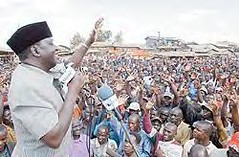
Raila Odinga, Presidential candidate for the Orange Democratic Movement in Kenya, visited the United States between Sept. 8-11, 2007.
Originally uploaded by Pan-African News Wire File Photos
Kenyan opposition leader confident despite vote-rigging fears
NAIROBI (AFP) - Kenya's main opposition candidate Tuesday expressed confidence of victory in a closely fought presidential election, despite fresh allegations of vote-rigging emerging two days ahead of the vote.
Raila Odinga, 62, a flamboyant former political prisoner who leads the incumbent, President Mwai Kibaki, in most opinion polls, said he was confident of a "vote for change" in Thursday's ballot.
"We have done all that was humanly possible in these campaigns given the constraints that were there," Odinga told reporters after attending Christmas mass in the capital Nairobi.
"Therefore I have a lot of confidence that the people of this country will vote for change."
Odinga added: "I've appealed to President Kibaki to prevail on his agents against election rigging acts that could plunge this country into bloodshed ... My appeal has gone unheeded."
Odinga told reporters that police were being used to rig the polls after a local KTN television report claimed police were transporting "marked ballot papers" to polling centres.
"Policemen are being used to rig the elections ... They were issued each with 1,000 pre-marked ballot papers to be stuffed by them," Odinga told reporters.
But government spokesman Alfred Mutua dismissed the television report as "irresponsible journalism". Electoral chief Kivuitu said everything had been done to prevent any vote-rigging.
Meanwhile thousands of electoral clerks across the country demonstrated for a wage increase of 700 shillings (11 dollars) a day and threatened not work on election day.
Kivuitu, dismissed the threat, officials said.
President Kibaki meanwhile attended a Roman Catholic mass in the capital and walked away without speaking, but Cardinal John Njue told "all registered voters to vote wisely for leaders who will serve them for the next five years."
The president, who has received backing from his predecessor Daniel arap Moi, later visited patients in the main hospital and a children's home where he gave out Christmas gifts.
Final opinion polls released last week gave Odinga 43 to 45 percent, ahead of Kibaki's 36.7 to 43 percent. Only a survey conducted by US pollster Gallup showed Kibaki on top, with 44 percent to Odinga's 43 percent.
Pollsters indicate Odinga's charisma has gained him support beyond his tribal constituency. But he has joined seven political parties in 15 years, leading to charges of being a populist and an opportunist.
While Kenya is poised for its tightest race ever, policy differences between the two are imperceptible.
The east African country has averaged annual growth of five percent since the 2002 polls and Kibaki has campaigned for continuity, boasting his economic achievements and measures such as free primary education.
He has however been criticised for failing to tackle corruption and push reforms, notably a new constitution that would diminish the president's powers and create the position of prime minister.
Escalating tribal rhetoric has prompted fears of communal unrest in Kenya, which has been more stable than its neighbours since its 1963 independence from Britain, although it has a history of electoral violence.
Kenya's leading rights group says that at least 70 people have died in poll-related violence since the campaign started, but few incidents have been reported in recent days and candidates have appealed for calm.
Police said they had beefed up security in 27,000 polling stations across the country that will be manned by around 15,000 electoral observers.
"Comprehensive security arrangements are now in place, but we are asking the public to be very familiar with the laws, particularly respecting the electoral law," national security spokesman Eric Kiraithe told AFP.
Kenyans will also elect 210 members of parliament and more than 2,000 local councillors, with some observers predicting that increasingly demanding voters could vote out up to 70 percent of sitting MPs.
No comments:
Post a Comment